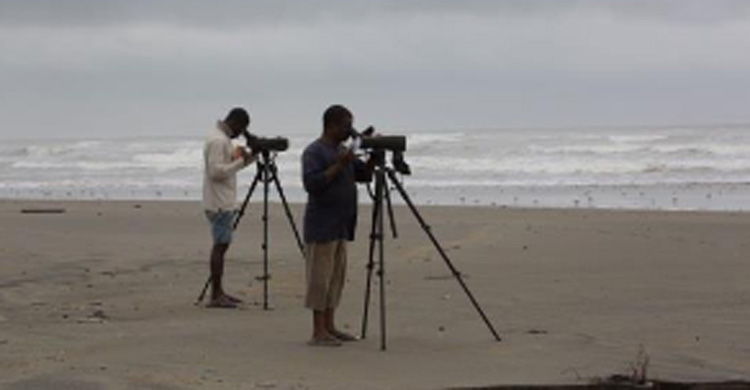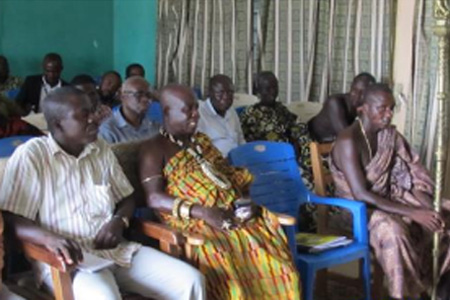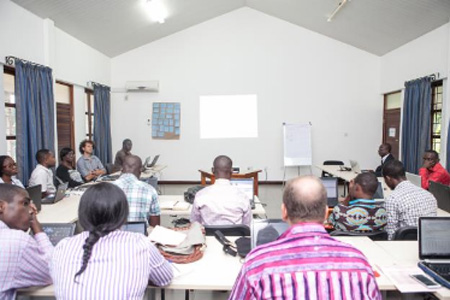Successful Completion of AEWA SGF Project in Ghana

© Center for African Wetlands
Bonn, 18 December 2014 – The Center for African Wetlands (CAW) in Ghana has recently finalized its project co-funded by AEWA entitled “Priority setting and conservation of migratory waterbird species at key coastal sites in Ghana”. The project aimed at gaining a better understanding of trends in populations of waterbird species, reviewing the importance of Ghana’s coastal wetlands for waterbirds as well as advocating enhanced management of designated Ramsar sites and protection of other key sites for waterbirds. Financial support was provided by the AEWA Small Grants Fund (SGF).
Launched in January 2013, the project analyzed data collected from waterbird counts conducted in the country since 1987, when waterbird populations were first monitored at selected coastal sites. After extensive entry and cleansing of data, the Center for African Wetlands now has an up-to-date database which holds information on the monthly waterbird counts since 1987, and covering Ghana’s five Ramsar sites (Densu Delta, Sakumo Lagoon, Muni-Pomadze, Keta Lagoon and Songor) as well as other important locations.

Another project activity was the entry and analysis of demographic data on the Sanderling (Calidris alba), a species for which Ghana provides important wintering grounds. Data collected since 2007, including through re-sightings of colour-ringed specimens, were inserted into a designated database which will also accommodate future Sanderling re-sighting information. The grant has also helped to continue studies on the feeding ecology of this species. The results of this activity were presented at the most recent Annual Conference of the International Wader Study Group (Estonia, September 2014) which has helped to secure additional funds for the continuation of the studies for a further year.
In order to enable the efficient and reliable analysis of data on long-term population counts, a training course on the use of a specialized statistical software was delivered locally at the Center for African Wetlands, in close collaboration with the University of Ghana, under the mentorship of Mr. Thomas Oudman (Institute of Sea Research in the Netherlands) and Dr. Nana Ama Browne Klutse (School of the Nuclear and Allied Sciences, University of Ghana). Alongside 29 affiliates from the University of Ghana, two CAW project staff members participated in this training course, which has enabled them to carry out immediate analysis of available bird count data, as well as future data analysis.
The data obtained from this AEWA SGF co-funded project has also helped to stress the ornithological importance of the Amansuri Wetland, and further promote its designation as a Wetland of International Importance (or ‘Ramsar Site’). Ringing data on Sanderling survival - collected at the Esiama site which belongs to the Amansuri Wetland on Ghana’s western coastline - were vital in order to reveal the wetland as an important site for the Sanderling, with a maximum of over 4,500 birds recorded at any one count. Other waterbirds which were observed in nationally important numbers at this site included the Common Ringed Plover, Grey Plover, Royal Tern, Sandwich Tern and Common Tern.
Based on the data collected, discussions with key stakeholders such as the Ghana Wildlife Division (which is the AEWA implementing agency) and the Ghana Wildlife Society re-emphasized the importance of the Amansuri Wetland. The data also enables the completion of the documentation required for its designation a Ramsar Site.

The importance of the Amansuri Wetland for species, and also for local communities, was further highlighted in an awareness-raising workshop, organized by the Center for African Wetlands in collaboration with the Ghana Wildlife Division and the Ghana Wildlife Society in May 2014. Forty participants from neighbouring communities participated in this project activity.
The AEWA SGF grant has contributed to supporting waterbird conservation activities initiated by projects supported by partners including CAW, the Royal Society for the Protection of Birds, the Global Flyway Network and Working Group International Waterbird and Wetlands Research.
The UNEP/AEWA Secretariat congratulates the Center for African Wetlands and its partners on the successful completion of the project and hopes that the long-term activities to which this project contributed can be continued. For more information on the project please contact Prof. Yaa Ntiamoa-Baidu, Chair of the Center for African Wetlands at ynbaidu@ug.edu.gh or info@afriwet.org.
About the AEWA Small Grants Fund
The AEWA Small Grants Fund became operational in 2010 and has since benefitted 11 conservation projects from 11 African countries with funds amounting to over EUR 200,000. The next call for proposals will be launched in 2015.
For more information on the AEWA Small Grants Fund please visit the AEWA website.
Center for African Wetlands (CAW)
The Center for African Wetlands (CAW) was founded in 2000 and is hosted by the University of Ghana. It aims at preserving the global, sub-regional, national and local value of wetlands for the benefit of the society as a whole, improving the quality of life for people living around the wetlands and maintaining wetland biodiversity.
More information on the Center for African Wetlands is available under this link.
The Global Flyway Network (GFN)
The Global Flyway Network is a partnership between researchers worldwide who are devoted to long-term demographic work on long-distance migrating shorebirds. For further information, please visit http://globalflywaynetwork.com.au/
Working Group International Waterbird and Wetland Research (WIWO)
The Working Group International Waterbird and Wetland Research serves as an intermediary between financing organizations and governmental bodies, as well as between these financial organizations and volunteer ornithologists working on waterbird studies in countries with limited potential for such studies. Further information can be found here: http://www.wiwo.org/
Royal Society for the Protection of Birds (RSPB)
RSPB is the United Kingdom’s largest nature conservation charity, focusing on the conservation of birds and other wildlife in the UK, as well as internationally, and restoring and protecting their natural habitats. For further information please visit http://www.rspb.org.uk/
By Melanie Jakuttek, Birgit Drerup and Evelyn Moloko.
Last updated on 13 January 2015


